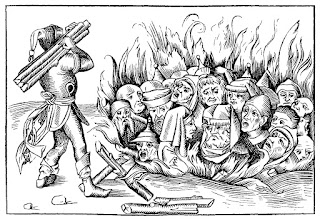Chanuka Candles and the 117 Alexandrian Massacre
117 CE
Alexandria, Egypt
During the holiday of Chanuka, Jews light candles to celebrate the holiday and, according to the Talmud Bavli, to commemorate a miracle in which a small jar of pure oil lasted for eight days. We light candles in a visible location to publicize the miracles of the holiday and as a symbol of our joy. However, due to the often precarious situation of Jews in the world, the law states that "in a time of danger, when one cannot keep this mitzva [of lighting in a public place], one can place it on their table and this is enough." (Shulchan Aruch, 671:5, based on Talmud Bavli Shabbat 21b)
This, unfortunately, was not an idle concern and recalls a story about Alexandria.
The Jewish community in Alexandria was one of the strongest and oldest in the diaspora. It's not surprising that it was also one of the earliest locations of anti-Jewish riots and synagogue violence. Riots took place in 38 CE, 40, and 66, but the biggest one occurred in 117, known in Jewish sources as the Kitos Persecution or the Diaspora Rebellion.
The pride and joy of the Alexandrian Jewish community was its magnificent synagogue, designed in the style of a basilica and described in several ancient Jewish texts. The Talmud relates that the synagogue was destroyed by the evil Trajan:
"In the days of the evil Trajan, a son was born to him on the Ninth of Av, and the Jews were fasting.
The son died on Chanuka and the Jews lit candles.
His wife sent to him: before you conquer the barbarians, come and conquer the Jews who are rebelling against you..."
It is unclear whether the Talmud is criticizing the Jews for being over-zealous with their celebration of Chanuka, knowing that they were already in hot water over fasting on the day of Trajan's son's birth. In any case, the Talmud continues to relate the tragic results:
"He brought his legions and killed them. He said to the women: listen to my legions and I won't kill you. They responded: what you did on the ground you should do in the balcony, and their blood all mingled and flowed to the sea, reaching Cyprus."
(Talmud Yerushalmi Sukka 5:1, also introduction to Midrash Megilat Esther, and Eicha Rabba 1)
Scholars (see, for example, William Horbury, Jewish War under Trajan and Hadrian, 231) explain that the men and women of the Alexandrian community were slaughtered in their synagogue. The women, who were upstairs in the balcony, were given the choice of submitting to the wills of the Roman soldiers, but chose instead to die along with their husbands. Thus occurred a great massacre of the Alexandrian community.
Alexandria, Egypt
During the holiday of Chanuka, Jews light candles to celebrate the holiday and, according to the Talmud Bavli, to commemorate a miracle in which a small jar of pure oil lasted for eight days. We light candles in a visible location to publicize the miracles of the holiday and as a symbol of our joy. However, due to the often precarious situation of Jews in the world, the law states that "in a time of danger, when one cannot keep this mitzva [of lighting in a public place], one can place it on their table and this is enough." (Shulchan Aruch, 671:5, based on Talmud Bavli Shabbat 21b)
This, unfortunately, was not an idle concern and recalls a story about Alexandria.
The Jewish community in Alexandria was one of the strongest and oldest in the diaspora. It's not surprising that it was also one of the earliest locations of anti-Jewish riots and synagogue violence. Riots took place in 38 CE, 40, and 66, but the biggest one occurred in 117, known in Jewish sources as the Kitos Persecution or the Diaspora Rebellion.
The pride and joy of the Alexandrian Jewish community was its magnificent synagogue, designed in the style of a basilica and described in several ancient Jewish texts. The Talmud relates that the synagogue was destroyed by the evil Trajan:
"In the days of the evil Trajan, a son was born to him on the Ninth of Av, and the Jews were fasting.
The son died on Chanuka and the Jews lit candles.
His wife sent to him: before you conquer the barbarians, come and conquer the Jews who are rebelling against you..."
It is unclear whether the Talmud is criticizing the Jews for being over-zealous with their celebration of Chanuka, knowing that they were already in hot water over fasting on the day of Trajan's son's birth. In any case, the Talmud continues to relate the tragic results:
"He brought his legions and killed them. He said to the women: listen to my legions and I won't kill you. They responded: what you did on the ground you should do in the balcony, and their blood all mingled and flowed to the sea, reaching Cyprus."
(Talmud Yerushalmi Sukka 5:1, also introduction to Midrash Megilat Esther, and Eicha Rabba 1)
Scholars (see, for example, William Horbury, Jewish War under Trajan and Hadrian, 231) explain that the men and women of the Alexandrian community were slaughtered in their synagogue. The women, who were upstairs in the balcony, were given the choice of submitting to the wills of the Roman soldiers, but chose instead to die along with their husbands. Thus occurred a great massacre of the Alexandrian community.


Comments
Post a Comment